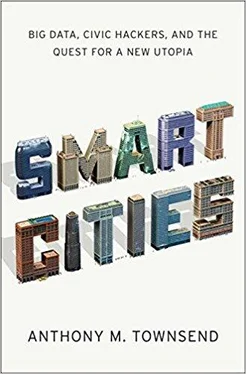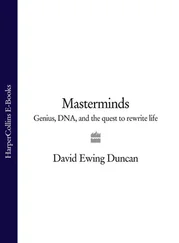The stakes in this gamble on smart couldn’t be higher. Built with the last of the national government’s massive 2009 stimulus spending, and opening in the wake of a series of elections that saw Mayor Juan Alberto Belloch barely survive a nationwide left-wing rout, the outcome of Zaragoza’s gamble on the Center for Art and Technology campus is far from certain. But it is an inspiring example of how different a smart city can emerge when civic leaders craft a big vision that reflects the needs and aspirations of an entire community and mobilize the resources to deliver it. Corporate smart cities chase the Holy Grail of efficiency, while the grass roots explores the possibilities of social technology, but in Zaragoza—as in most real cities today—citizen engagement and economic development are the pressing challenges.
Sarasa makes the priorities clear. “We are creating a machine to create jobs. This has to produce things for the city.”
Leadership for the Smart City
Toward the end of 2011, IBM threw a big party for Rio de Janeiro. “How is that mayors are getting things done, while other leaders seem stuck?” asked IBM’s chairman Sam Palmisano from the stage of the Smarter Cities Forum. Palmisano would soon step down, easing into retirement after setting the firm on course for decades’ worth of smart-city-driven growth. Rio’s mayor, Eduardo Paes, basked in the appreciation, quietly calculating the political payout from his decision to call in Big Blue to build the city’s Operations Center. “These city leaders are nonideological,” Palmisano posited, echoing storied New York City Mayor Fiorello LaGuardia, who famously said “There is no Democratic or Republican way of cleaning the streets.” Palmisano concluded, “They get things done.... Smarter city leaders think—and manage—for the long term.”38 At the very least, for the next election.
Today, cities are the most pragmatic and effective level of government. In an era of gridlock at the national level, as Parag Khanna and David Skilling, who both serve as foreign policy advisors to the nation-state of Singapore, have argued in their essay “Big Ideas from Small Places,” “cities and provinces around the world are assuming a more important leadership role on global policy issues.”59 Even as they grow larger, cities maintain a sense of shared destiny that mobilizes people to work together. We’ve seen this pragmatic focus at work throughout this chapter. Consider what the average mayor sees when she looks out her window at the city she runs— the thankless work of delivering reliable transportation, safe streets, and high-quality health care and education. These functions dominate municipal budgets and draw public ire when they are mismanaged. As they grasp for solutions, these new technologies hold tremendous appeal.
Companies like IBM think the solutions they’ve built for business can solve problems for city governments. But cities aren’t companies. Big technology companies have spent a half-decade educating mayors about technology, yet their own understanding of how cities work is wanting. As Boston’s Nigel Jacob explained, “We’ve seen nothing but missteps” from industry. “Because they want to see the city broadly as an enterprise, they make a huge number of assumptions about what’s driving what. They will often miss huge dimensions of how we actually operate.”60 Palmisano may be able to convince himself the world’s mayors are nonideological technocrats, but his employees and their customers face the reality of urban politics every day.
The limits of grassroots methods of engineering smart solutions to public problems are clear too. Few civic hackers want to do the dull, dirty, and dangerous work that IBM’s engineers are asked to tackle. For all their creativity, apps contests still haven’t produced much of lasting value for the broader public. One of France’s leading Internet activists, Daniel Kaplan, said it best when he called the results of apps contests “mostly proofs of concepts (or of their programmers’ skills), with at best anecdotal benefits for ordinary citizens.”61 Efforts to mobilize citizen participation through the Web and social media have their work cut out for them.
So who is going to design the smart city of the future, if the geeks on both sides of the street don’t truly grok the challenge? In the end it will be up to the mayors and their teams. They’ll hedge their bets, buying things from big corporations while simultaneously seeding grassroots efforts to solve the same challenges. When that doesn’t work, they’ll just build their own. They’ll do whatever it takes to get the job done with the limited resources they have.
But as a new model for civic leadership in the design of smart cities unfolds, there are lots of open questions. How can they make sure there are opportunities for both industry and grassroots efforts to innovate? How do they empower citizens to create and provide new public services but not be tempted to offload government’s responsibilities? How will they collect and aggregate data about the city for public good but build safeguards to prevent it from being misused? None of these issues will be resolved soon, and they will crop up repeatedly. One thing is sure. They will land on the desks of city leaders, because no one else will want to deal with them.
8. A Planet of Civic Laboratories
Peter Hirshberg spins his laptop around. Bold white letters on a black background spell out OccuAPl. “I have no idea what it means,” he chuckles. “But 1 like it.”1 It’s November 2011. A dozen blocks south, the Occupy Wall Street protests are reaching their violent zenith in Zuccotti Park. The city is on edge from daily marches that take the “99 percent” and their riot gear-clad chaperones tramping across Manhattan. Police helicopters hover like angry wasps overhead. Hirshberg’s neologism is an attempt to capture the excitement of the Occupy movement as well as the more subtle technological transformation of citizen-government interaction by open data and apps.
America is no stranger to youth movements, though it had been a long time since one loomed so large in the public mind. The closest analogue is probably 1967, when tens of thousands of young people descended on San Francisco’s Haight-Ashbury district. In a hothouse of social experimentation that became known as the “Summer of Love,” they shared everything—housing, food, drugs, and sex. The enormous cultural impact of that psychedelic freak-out on American society can be felt today, and it still casts a long shadow over San Francisco. There, Hirshberg has been a driving force behind a new creative space just down the hill from Haight-Ashbury, the Gray Area Foundation for the Arts. Both physically and spiritually, it sits at the intersection of that 1960s counterculture and a new techno-utopianism. It’s just a few steps to either Twitter’s headquarters or the head office of Burning Man, the radical art festival that builds a temporary city in the Nevada desert each summer.
Though he takes inspiration from the hippies, Hirshberg is politically pragmatic. He soon slaps his laptop shut and stops playing dumb. “Look,” he says, “in the 60s you protested the establishment. Today you just write to its API.” For Hirshberg, the way to accelerate change is to plug revolutionary software directly into government databases.
Nowhere has the creative urge of smart-city hackers come into such direct synergy with efforts to reinvent city government than in San Francisco. The story begins in November 2010, when longtime mayor Gavin Newsom was elected as California’s next lieutenant governor. With more than a dozen candidates tossing their hat in the ring to succeed him at the city’s helm, and the local economy once again riding a frothy wave of start-up-driven innovation, Hirshberg saw an opportunity to spark a public debate about how technology could be harnessed to improve government. He first tried to convene a workshop with the candidates, but was overcome by what he describes as “enthusiastic data syndrome.” Tilings didn’t click. It was “the classic conversation the geek has with the business user,” Hirshberg says. The candidates didn’t get it.
Читать дальше












